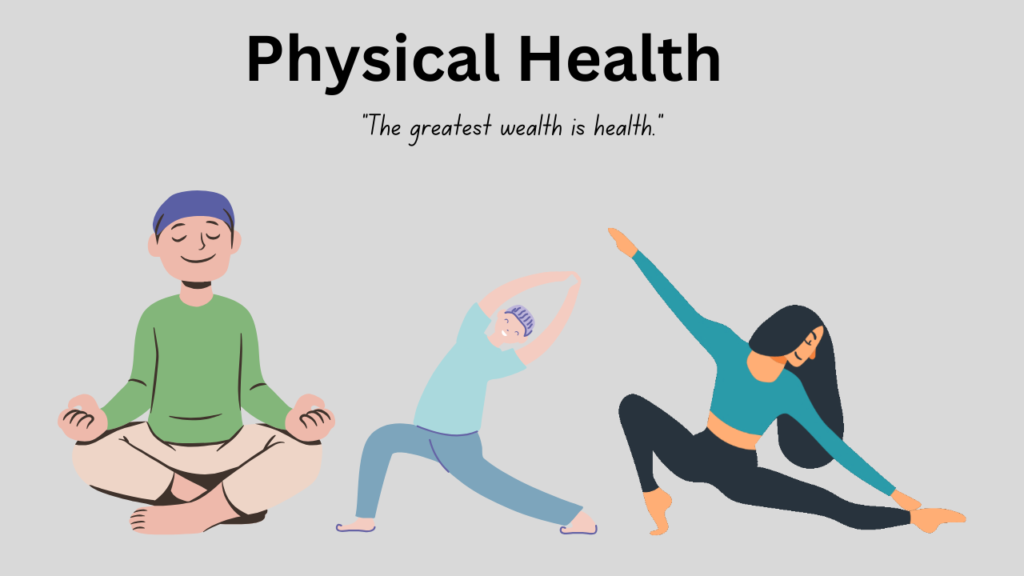Physical health refers to the proper functioning of our bodies and the absence of disease or illness. It encompasses various aspects:
- Cardiovascular Health: The health of our heart and blood vessels, crucial for pumping blood efficiently throughout the body.
- Muscular Strength and Endurance: The ability of muscles to exert force and sustain activity over time, important for mobility and everyday tasks.
- Flexibility: The range of motion in joints and muscles, which impacts mobility and prevents injury.
- Body Composition: The ratio of fat to muscle, bone, and other tissues in the body, influencing overall health and fitness.
- Nutrition: Consuming a balanced diet with essential nutrients to support bodily functions and energy levels.
- Sleep: Quality sleep is essential for physical recovery, immune function, and mental well-being.
- Hydration: Maintaining adequate fluid intake for bodily functions and to support overall health.

Benefits of Good Physical Health
Investing in our physical health yields numerous benefits that extend beyond just the physical realm:
- Improved Energy Levels: Regular physical activity improves cardiovascular fitness and enhances endurance, reducing fatigue and boosting energy levels.
- Enhanced Mental Health: Exercise stimulates the release of endorphins, neurotransmitters that promote feelings of well-being and reduce stress and anxiety.
- Better Sleep: Physical activity can help regulate sleep patterns and improve sleep quality, leading to better overall health.
- Increased Longevity: Maintaining good physical health reduces the risk of chronic diseases such as heart disease, diabetes, and hypertension, thus potentially increasing lifespan.
- Improved Quality of Life: Being physically healthy allows us to participate fully in daily activities, hobbies, and social interactions without limitations.
Achieving and Maintaining Physical Health
Achieving good physical health requires a balanced approach that integrates various lifestyle factors:
- Regular Exercise: Aim for at least 150 minutes of moderate-intensity aerobic activity per week, along with muscle-strengthening activities on two or more days per week.
- Healthy Eating: Consume a diet rich in fruits, vegetables, lean proteins, whole grains, and healthy fats while limiting processed foods, sugar, and excessive salt.
- Adequate Hydration: Drink enough water throughout the day to maintain hydration and support bodily functions.
- Sufficient Sleep: Aim for 7-9 hours of quality sleep per night to support physical recovery and mental well-being.
- Stress Management: Practice relaxation techniques such as meditation, deep breathing, or hobbies to reduce stress levels.
- Regular Health Check-ups: Schedule regular visits with healthcare professionals for preventive screenings and check-ups to detect and manage any health issues early.
Here are key strategies to help you achieve physical health:
Regular Exercise: Physical activity is fundamental to maintaining overall health and well-being. Aim for at least 150 minutes of moderate-intensity aerobic activity (such as brisk walking, swimming, or cycling) per week, or 75 minutes of vigorous-intensity aerobic activity (like running or playing sports). Additionally, incorporate muscle-strengthening activities (such as weightlifting or bodyweight exercises) on two or more days per week.
Balanced Diet: Nutrition plays a crucial role in supporting physical health. Focus on a balanced diet that includes a variety of fruits, vegetables, lean proteins, whole grains, and healthy fats. Limit your intake of processed foods, sugars, and excessive salt. Stay hydrated by drinking plenty of water throughout the day.
Adequate Sleep: Quality sleep is essential for physical and mental recovery. Aim for 7-9 hours of sleep per night. Establish a regular sleep schedule, practice good sleep hygiene (such as avoiding screens before bedtime and creating a relaxing bedtime routine), and ensure your sleep environment is conducive to rest.
Manage Stress: Chronic stress can negatively impact physical health. Practice stress management techniques such as deep breathing exercises, meditation, yoga, or engaging in hobbies and activities you enjoy. Regular physical activity can also help reduce stress levels.
Maintain a Healthy Weight: Achieving and maintaining a healthy weight is important for overall health. Combine regular exercise with a balanced diet to manage your weight effectively. Consult with a healthcare professional or registered dietitian for personalized guidance if needed.
Limit Alcohol and Avoid Smoking: Excessive alcohol consumption and smoking can have detrimental effects on physical health. If you drink alcohol, do so in moderation (no more than one drink per day for women and two drinks per day for men). Quit smoking if you currently smoke, and avoid exposure to secondhand smoke.
Regular Health Check-ups: Schedule regular visits with healthcare professionals for preventive screenings and check-ups. This allows for early detection and management of any potential health issues.
Stay Active Throughout the Day: Incorporate physical activity into your daily routine beyond dedicated exercise sessions. Take breaks to stretch or walk, use stairs instead of elevators when possible, and find opportunities to move throughout the day.
Build Strong Social Connections: Maintaining strong social connections and a support network contributes to overall well-being. Engage in social activities, spend time with friends and family, and participate in community events or groups.
Practice Consistency and Patience: Physical health is a long-term commitment that requires consistency and patience. Focus on making gradual, sustainable changes to your lifestyle habits. Celebrate small victories and stay motivated by tracking your progress.
By adopting these strategies and making physical health a priority in your daily life, you can achieve a healthier, more vibrant lifestyle. Remember that every positive choice you make contributes to your overall well-being and longevity.
